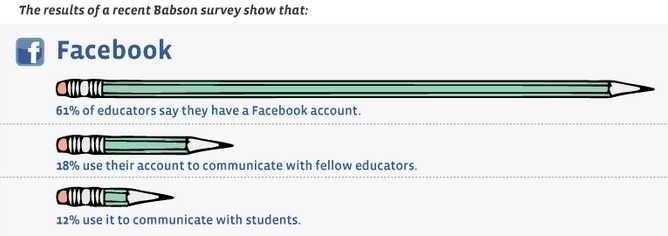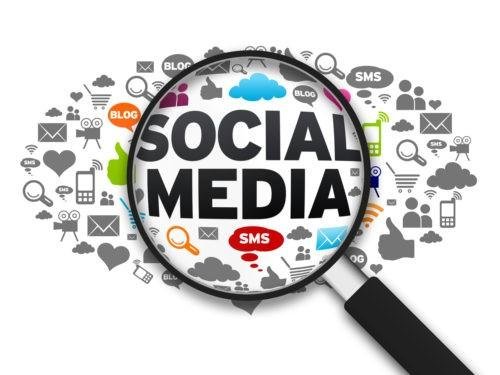Social media permeates today’s society with millions of us engrossed, some would argue to the point of unhealthy addiction, in the latest happenings via apps such as Facebook and Twitter. Facebook famously had its origins in Harvard University before extending to other colleges in the US, so it is perhaps appropriate to look at the role of social media in education today, a decade on from its beginnings in the bedrooms of Mark Zuckerberg and his college friends.

However, social media offers plenty of opportunities for learning and interactivity, and if you take a moment to think about it, it’s not too hard to see how students benefit from using social media.

From http://www.mindjumpers.com/blog/2011/04/education-industry-infographic-2/
Students are experiencing the world through more than just books and assignments; they are learning and adapting to the world using a relatively new form of communication. In a world where connections are important, graduates are coming into the workplace with a lot to offer.
According to usage statistics gathered earlier this year by Ofcom, 66% of all adults aged 16+ have a profile on at least one social networking site, and though the report doesn’t break down these figures by age group, it’s reasonable to assume that among those of university age, that percentage could potentially be much higher. We know that universities and other education providers have responded by increased use of social media marketing to showcase their courses and attract students, but are they harnessing the full power of the medium to engage and interact with those same students once they begin their studies? Does social media have a place as a teaching tool or is it simply a distraction?
It seems that some lecturers are indeed beginning to tap into the potential benefits of social media in education. Many faculties and societies have attuned to the fact that 75% of students admit to being on Twitter “all the time” ( Source : TopUniversities.com ) and are using the micro.
But what, specifically, do the students learn? Read on to find out.
1.CONNECTIONS
Social media networks are basically established for the purpose of communal connections. Today’s students are accessing Facebook, Twitter and even Instagram to connect and share with those around them. One of the most interesting things about social media is that users can interact and engage in lots of fun stuffs while broadening their intellctual horizon.

2.WEB ENGAGEMENT
Whether they are sharing personal pictures, links to other sites or even commenting on someone’s post, students engage, stretching beyond social interaction purposes alone. Students use social media day in and day out to interact with their peers and even teachers about class-related subjects. In a world where online engagement is important for businesses, these students are becoming experts at developing a sense of Internet presence. Not only do they know how to interact with others on the internet, they know how to use basic and even complex functions in order to do so.
3.KNOWLEDGE
Social media users share among themselves day in and day out, giving and receiving information at rapid speeds. This information is more than funny cat videos; they share views and opinions; tips, tricks, and even DIY projects; and, among students, helpful information for classes. For example, During my undergraduate school research program, I had to interview one of my professors from a far away state and it was made possible by the Whatsapp platform.
Their ability to assess, analyze, retain and share information is skyrocketing and they often don’t even realize they’re developing these skills. Only people born before the Internet was invented are likely to understand the magnitude of this new style of communication.
CONCLUSION
Obviously, its clear that Social media is an indespensable tool in the furtherance of the learning process either within the four walls of our learning institutions or outside of it. The possibilities for social media in education are equally exciting. Universities don’t even need to convince students of the value of social media – the students have already been won over, so it makes sense to talk to them in the online world they already spend most of their time inhabiting.

Thank you.

I hope you enjoyed the read. Pls dont forget to upvote the post. Thanks again.
Hi! I am a robot. I just upvoted you! I found similar content that readers might be interested in:
http://www.edudemic.com/how-students-benefit-from-using-social-media/